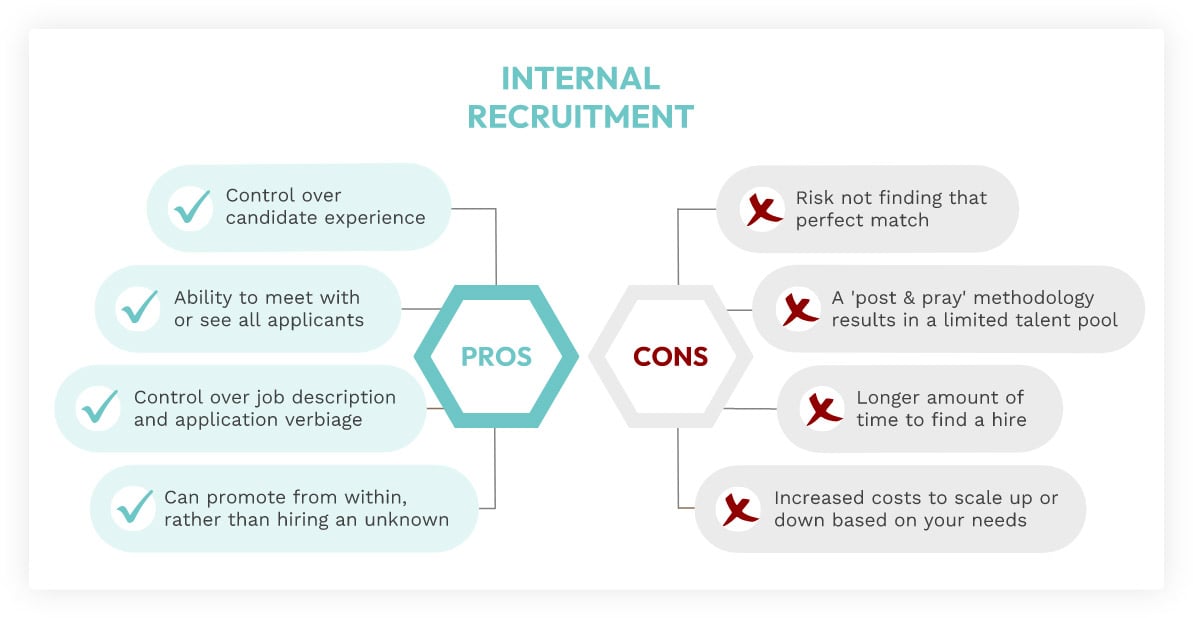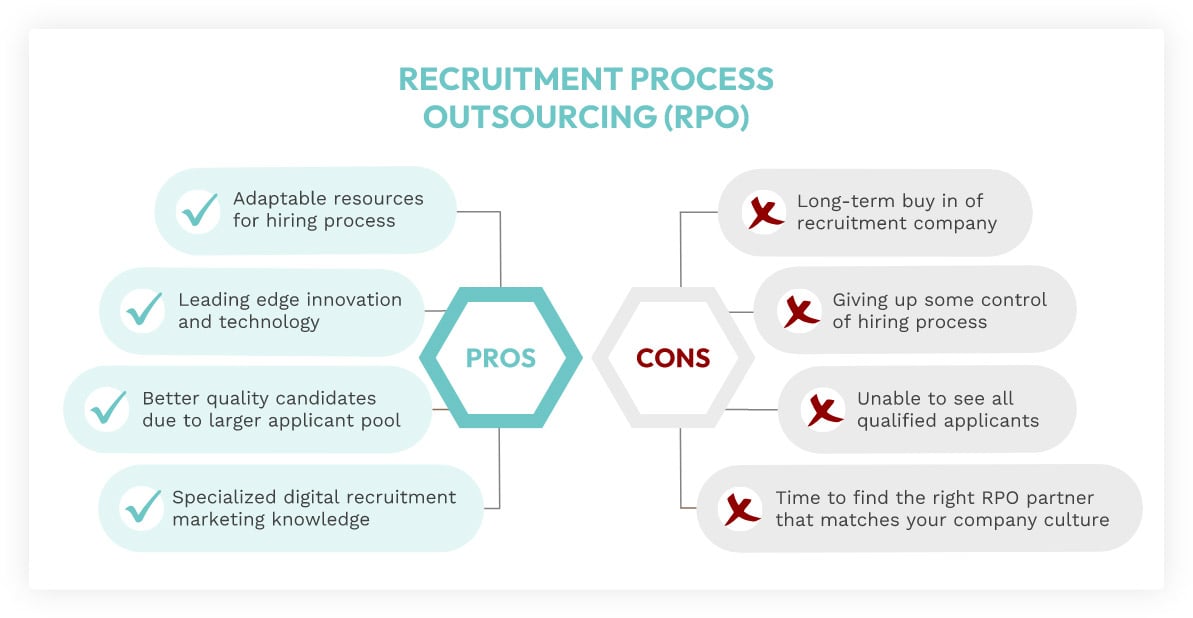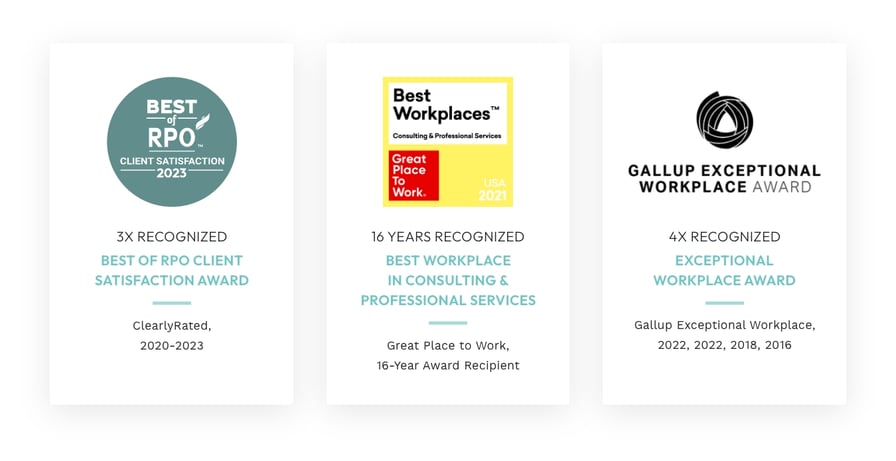Recruitment Process Outsourcing (RPO) is a rapidly growing solution in the HR and recruitment space. In fact, it's the preferred recruitment solution for many high-performing firms. According to data from ResearchAndMarkets.com, the global RPO market is projected to expand at a compound annual growth rate (CAGR) of 17.3% to $18.2 Billion by 2027.
A variety of fast-growing industries looking to stay focused on their core competencies—industries like IT, hospitality, telecommunications, manufacturing, construction, pharmaceuticals, healthcare, and more—are increasingly relying on outsourced recruitment services and driving this growth.
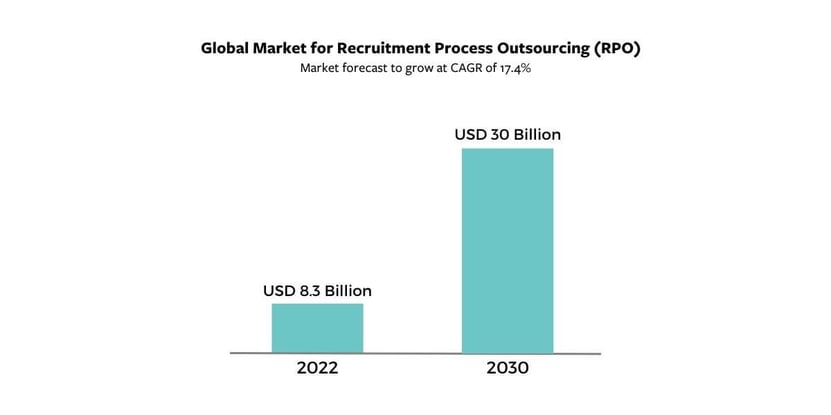
Many organizations no longer view recruitment process outsourcing providers as merely a means for cost- and time-savings in the recruitment process but as essential partners for optimizing their entire HR function.
Simply put, RPO recruiters get results. They have the expertise, tools, and vast amounts of data to significantly improve quality, efficiency, scalability, diversity, and agility in the recruitment process and the candidate experience.
So, what is RPO, how does RPO work, and what are the benefits of RPO? What’s more, which type of recruitment process outsourcing services are best for your company?
Keep reading to learn everything you need to know about recruitment process outsourcing or use the links below to jump to the sections that interest you.
- What is RPO (Recruitment Process Outsourcing)?
- RPO Solutions
- RPO Program Features
- RPO Pricing Models
- Benefits of RPO
- Is RPO Right For You?
- Finding the Best RPO Provider
- Implementation Process
- Managing an RPO Provider
What is RPO (Recruitment Process Outsourcing)?
Recruitment Process Outsourcing (RPO) is a form of business process outsourcing where an employer transfers all or part of its recruitment processes to a third-party service provider.
The responsibilities of an RPO provider can include the following:
|
|
|
|
|
|
|
|
|
|
An RPO provider may recruit under your brand, using their own dedicated recruitment team and custom strategies, or they may assume your company's staff, technology, methodologies, and reporting.
RPO companies work closely with your organization to define recruitment needs, assess current processes, and pinpoint areas of improvement. Based on the unique factors of each company, RPO providers can customize solutions, service level agreements, and success metrics to create a tailored recruitment strategy.
With their flexibility and expertise, organizations of all sizes and within different industries can benefit from having an RPO partner to find better candidates faster.
How does Recruitment Process Outsourcing work?
The process begins with a discovery period, during which the RPO company learns about your hiring goals and develops a customized strategy. Together, you set partnership expectations and KPIs and enter into an agreement that outlines the scope of work, timeline, and service-level expectations. The recruitment RPO company can then manage and execute the agreed-upon recruitment tasks and responsibilities.
Below is an overview of the typical steps that go into the recruitment process. An RPO partner may take over one, two, or all of the steps involved in finding your organization qualified employees.
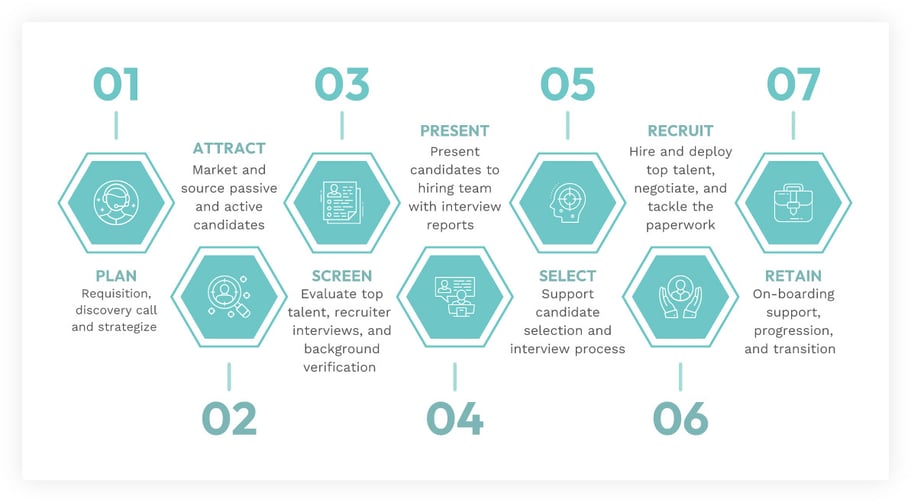
1. Plan: The first step of the process usually involves a discovery call, during which the RPO partner assesses your hiring needs and develops a strategy to meet your goals effectively.
2. Attract: Once a plan is established, they will develop or revise job descriptions, implement digital marketing strategies, and leverage their talent pools to attract and find the best candidates for your job.
3. Screen: After your RPO partner develops a list of top candidates, they will conduct screening interviews, assessments, and reference checks to narrow the list down to the most qualified.
4. Present: At this stage, you will be presented with a list of top candidates and debriefed on each interview.
5. Select: Your RPO partner will help you make a confident and well-informed decision by providing recommendations and evaluating candidates against the job requirements, your company culture, and values.
6. Recruit: Once you select a candidate, your RPO partner can manage the offer and negotiation process, as well as the administrative work that comes once the offer is accepted.
7. Retain: An RPO partner can support the onboarding process by providing an efficient and seamless transition process, ensuring a great candidate experience from start to finish.
Whether your RPO company manages the entire recruitment process or you decide to keep parts of it in-house is up to your team. Regardless of their level of involvement, you should view them as an extension of your internal talent acquisition team, working hand-in-hand to hire the right candidates.
How is RPO different from staffing agencies?
RPO companies can assume ownership of the entire recruitment process, from sourcing to onboarding. They can go beyond filling seats by focusing on critical recruitment pain points such as decreasing premium labor, finding the right fits for your values and vision, and increasing employee retention. This approach allows organizations to outsource their recruitment process entirely to a specialized provider, saving time, cost, and internal resources.
On the other hand, staffing agencies or recruitment firms act as intermediaries between job seekers and organizations. Recruitment agencies focus primarily on candidate sourcing, screening, and placement, providing pre-screened candidates to the client for consideration. They typically employ their workers and provide them with benefits and payroll. The client is usually charged a fee based on a percentage of the candidate's salary or paid a flat fee per hire.
Another notable difference between RPO and traditional recruitment agencies is the scope of services provided. RPO programs can offer more holistic and comprehensive recruitment services such as employer branding, workforce planning, compliance, and onboarding support. This integrated approach can help organizations streamline their recruitment process and improve their talent acquisition strategy.
Additionally, RPO companies can work on a longer-term basis than traditional staffing agencies or recruitment firms. While traditional recruitment firms may work on a project or contingency basis, RPO providers usually establish long-term partnerships with their clients, providing ongoing recruitment support and strategic talent acquisition planning.
| RPO | Contract Recruiter(s) | Contingent Firm | |
|
Recruiters representing your brand |
X | X | |
| Recruitment Marketing Resources | X | X | |
| Advanced Technology Suite | X | X | |
| Management Oversight | X | X | X |
| Onsite Support | X | X | |
| Accountable for filling positions | X | X | |
| Hiring Event Support | X | X | |
| Culture-Based Hiring | X | X | |
| Scalable & Adaptable | X | ||
| Proven Processes | X | X | X |
| Guaranteed Results | X |
RPO Services
Several different types of RPO services exist, each designed to fit the individual needs of a particular organization.
Here are the main types of RPO services:
Total Talent Acquisition
An RPO company becomes your talent acquisition team, handling every step of the process from sourcing to onboarding to retention and consulting on best practices.
Enterprise RPO
Otherwise known as a full-service solution, this model involves outsourcing the entire recruitment process to an RPO provider, from candidate sourcing to onboarding. This RPO service works best for companies with annual hiring needs above 1,000 jobs or those with specialized hiring needs.
Project RPO
Utilized for specific projects with set start and end terms, an RPO recruiter will take responsibility for all aspects of recruitment, but only for a specific period of time or project. Project RPO solutions are ideal for companies that don’t hire throughout the year or who have bulk hiring needs due to business expansion.
Hybrid RPO
In this model, an RPO provider splits the recruitment process with a company's existing in-house team or other providers. Companies can outsource specific recruitment needs based on roles, location, or business units. This option is beneficial when companies want to outsource only some of the process to one provider and leverage their expertise in certain areas
Contract Recruitment
With a contract recruitment solution, an RPO provider will deploy RPO recruiters to make immediate contributions. Contract recruiters will be immersed in your organization and culture and will help enhance your in-house talent acquisition team.
RPO Program Features
Every RPO program offers a unique blend of features to best meet your organization's talent acquisition goals.
Recruitment Marketing
The goal of taking a digital marketing approach to recruitment is to strengthen the talent acquisition strategy and employment brand footprint.
A good RPO partner can provide digital marketing expertise and apply it to recruitment operations to increase job distribution, improve candidate quality, and enhance recruitment efficiency. Here's how:
- Tech stack optimization: Enhance career website UX, workflows, and applicant tracking systems (ATS).
- Advertising and campaigns: Get job postings in front of the right candidates through research, SEO, campaign strategy, and budget recommendations.
- Digital footprint: Strengthen employer branding and ensure messaging is consistent on your website, social media, and job boards.

Technology
RPO companies can provide a range of technology platforms to streamline recruitment processes and manage talent pipelines. These solutions enhance the different stages of recruitment, such as:
- Sourcing: Job boards, candidate databases, referral tools
- Engaging: Text engagement software, CRM, recruitment marketing tools, social networks
- Selection: Skill and behavioral assessments, reference and background check software, video interviewing technology
- Hiring: ATS, data analysis software, onboarding tools
While these digital tools work well to streamline processes and improve the candidate experience, RPO providers also understand how to strike the proper balance between digital and personal.
For example, not all candidates would feel comfortable being interviewed via AI or chatbot (in fact, most prefer to speak to a real person). However, when used correctly, an RPO company's digital tools can give candidates the recruiting experience they expect by delivering prompt communication, status updates, and responses.
Dedicated Team of Experts
When working with an RPO company, you gain a team of experts whose time is 100% dedicated to finding the right fit for your open positions. A good RPO partner is constantly looking for ways to enhance your overall talent acquisition process, system, and structure. Plus, they can ensure their recruiters are current on the latest training and recruitment trends.
Labor Market Analytics & Reporting
A good RPO provider is actively engaged in using data throughout your partnership. They can access and analyze labor market insights on talent availability, skill shortages, and compensation analysis to proactively adjust strategies and improve processes.
RPO partners keep their clients abreast of the program's progress through reports that include data from recruiters and campaigns. Metrics can include the number of total openings, the age of openings, the number of candidates sourced and submitted, the percent of jobs presented against, and other agreed-upon metrics.
RPO Pricing Models
Various pricing models are available to meet different budgets and hiring goals. Understanding the different types of RPO pricing models can help you make an informed decision when selecting a provider.
- Management fee: The RPO company is paid a flat monthly fee for managing the recruitment process. Pricing depends on the size and complexity of the solutions provided. This model is typically associated with enterprise RPO services.
- Cost per hire: Your RPO provider charges a fee for every hire. This model is often associated with project RPO services.
- Management fee plus cost per hire: This model combines the above-mentioned models. The provider receives a monthly service fee and payment for successful hires. This is typically associated with enterprise recruitment process outsourcing services.
-
Cost per slate: This is a sourcing model — an RPO provider charges a fee for providing a set number of sourced, screened, and qualified candidates.
- Cost per transaction: This fee is based on specific processes such as an initial screening or reference checks. Once these processes are completed, a fee is charged. This is typically associated with on-demand RPO or consultation services.
Benefits of Recruitment Process Outsourcing
Recruitment Process Outsourcing services provide several benefits to organizations of all sizes and industries. The most critical benefit is that they mitigate the time and investment needed to keep up with talent acquisition trends and optimize the recruiting experience.
Below is a list of other benefits of partnering with an RPO recruiter:
Improve Cost Efficiency
Although the cost of recruitment process outsourcing depends on talent needs, it is typically more cost-efficient than building an in-house team with the same resources. They can improve the efficiency of the process and achieve better results with fewer resources. Plus, all recruitment-related expenses are included in the partnership fee, including advertising costs, software, technology, office spaces, and recruiter salaries and benefits.
In addition, you can experience indirect cost savings such as decreased turnover, improved time-to-hire, and higher-quality candidates.
Enhance Candidate Experience
RPO partners can strengthen the candidate experience by optimizing the application process, monitoring candidate reviews, and communicating with candidates in a timely and appropriate manner.
According to a recent BCG survey of 90,000 people from 160 countries, candidates have very strong feelings about what matters to them in a job search and in the recruitment journey.
- 66% said that a timely, smooth process is the number one way for an employer to stand out during recruitment.
- 52% said that they would refuse an otherwise attractive offer if they had a strong negative experience during the recruitment process.
As competition intensifies in today's job market, employers must ensure they deliver the best candidate experience and application process to remain competitive. In fact, even when candidates don't get the job, they are more likely to recommend a company if they have a positive experience during the application process.
Upgrade Candidate Quality
RPO companies are constantly building their talent pipeline with pre-vetted candidates, making it easy to fill positions quickly. They also have the time, expertise, and tools to source high-quality candidates across multiple target personas.
For example, although one company may have various job openings, the requirements for the roles and the value propositions for the candidates may vary drastically, creating a need for multiple customized candidate journeys.
By accessing and analyzing various data points, an RPO provider can build the perfect persona for each role, optimize the experience, and fill each job quickly with the right people.
Provide Scalability
During rapid market fluctuations, it's crucial to adjust your resources quickly and cost-effectively. An RPO partner enables organizations to increase or decrease resources according to changing demands without impacting internal resources. Additionally, a dedicated RPO partner monitors and forecasts talent trends to help you proactively plan for future recruitment needs.
According to a study by RPOA, 80% of employers say they would need at least four to six weeks to ramp up their talent acquisition teams after a reduction in force, while employers working with an RPO could do it almost instantly.
Boost Hiring Efficiency
RPO recruitment can decrease time-to-hire by streamlining the recruitment process and identifying inefficiencies. They can implement best practices, use innovative technology, and provide training to recruitment teams to enhance productivity and effectiveness. They can also tap into a wide network of candidates, including passive job seekers, to find the right candidates faster.
60% of employers say their hiring process became faster when they partnered with an RPO company according to the 2023 RPO Trends Report.
Reduce Turnover
A good RPO partner will take the time to learn your organization's culture and values to understand who would be a good fit. Hiring candidates who align with your values typically results in stronger, happier, and more engaged teams that stay long-term.
On the other side of the coin, an RPO provider will also understand what candidates value. Is it salary? Health and wellness benefits? Growth opportunities? Work-life balance and flexibility? Employee assistance or family support services? All of the above?
As they develop your candidate personas, RPO providers will learn which benefits are most attractive to each candidate and ensure those are highly touted, again increasing the chance of a better fit and improving retention.
RPO Providers go beyond filling open positions.
One of the main differentiators from traditional recruitment solutions is the holistic approach to talent acquisition. In addition to filling positions, your RPO provider can provide strategic expertise to help:
-
Reach DEI goals: RPO providers can help organizations achieve their DEI goals to build a more diverse and inclusive workforce. To do this, they leverage various sourcing platforms, craft inclusive job descriptions, and provide training to avoid unconscious bias throughout the recruitment process. Some offer DEI-certified recruiters who receive in-depth training on best practices to ensure their partners receive the expertise needed.
RPO providers also have the resources to explore international and emerging markets for diverse talent with the necessary skills who may be willing to work remotely or even relocate.
Case Study: How Hueman's long-term DEI recruitment plan increased diversity hires by more than 40% for one of our clients.
-
Future-proof recruitment strategy: Challenging economic times often force organizations to conduct layoffs or put them in a financial bind if they are not properly prepared. Although RPO companies can’t predict the economy, they can help recession-proof talent acquisition strategies to mitigate potential impacts.
- Fill specialized roles: Finding candidates for hard-to-fill roles can be incredibly challenging for any organization. RPO providers usually have access to a large pool of qualified candidates and can leverage their extensive network to find candidates who possess the specific qualifications needed for specialized roles. Their access to advanced recruitment tools also makes it possible to fill these roles faster.
- Strategic approach: Working with an RPO partner can alleviate HR teams and leaders from all of the day-to-day talent acquisition tasks, allowing them to focus on being strategic. According to an RPOA report, 97% of employers say that having an RPO partner allows them to focus on other business-critical priorities. RPO partners can provide valuable insights, metrics, and reports to help HR leaders make strategic business decisions. Whether you want to expand your business or need support handling unexpected challenges, a good RPO partner is also a consultative partner.
Is Recruitment Process Outsourcing Right for You?
There are a variety of recruitment solutions out there that can help you meet your hiring needs. RPO services are best suited for companies looking for strategic support to enhance their recruitment process rather than just needing to fill a few roles.
Consider the following factors to help you decide if recruitment process outsourcing is right for your organization.
Know your Hiring Needs
In order to decide whether RPO is the best solution for your organization, you'll need to understand why you are considering outsourcing recruiting in the first place. Are you experiencing rapid growth and need volume hires? Are you experiencing high turnover? Or do you need to fill only a few roles?
Once you define what type of support you need, it'll be easier to decide if an RPO provider can help you meet your goals.
Assess your Internal bandwidth
If recruiting is taking time away from focusing on your core business or responsibilities, RPO recruitment could be a good fit for you. Human Resources teams who split time between recruitment and other HR-related tasks can quickly become overwhelmed with their workload. Plus, they may not have the resources needed to successfully recruit quality candidates, which can result in bad hires.
If you are deciding between building your in-house recruitment team or outsourcing, consider the pros and cons of both:
Assess your Budget
One of the biggest myths of RPO is that the partnership is too expensive. However, many organizations are unaware of their current recruiting expenses and metrics.
Conduct a thorough audit of expenses to find what your cost-per-hire is by taking into account technology, subscriptions, salaries, and marketing and advertising. Also, don't forget to consider indirect costs such as employee turnover, time-to-hire, and quality of hires.
Check out this detailed breakdown of our partner's cost savings that resulted in a 294% ROI.
Consider the Timing
Like many good things, RPO services and partnerships take time to implement. The transition period varies from provider to provider, but the typical time you can expect is from one to three months. The implementation process is critical in order to reach the results you want.
Leadership Buy-In
A successful RPO partnership is one that an organization's leaders and stakeholders support. Ensure you build the case for RPO and get full leadership buy-in to maximize the benefits of recruitment process outsourcing.
Finding the Best RPO Provider
Once your organization is ready to invest in RPO solutions, you’ll want to vet out your provider options. Proper due diligence will not only save you time and money but also result in a stronger partnership with better results.
Assess Their Technology and Capabilities
Most RPO providers have knowledge and experience with different recruitment technologies. Find out which systems they’ve worked with and what relationship they have with different vendors to ensure they are equipped to effectively support your recruitment needs.
Gauge Their Industry-Specific Expertise
Though most RPO companies can hire across industries, it’s important to consider the level of expertise and experience in your specific industry, especially if you hire for highly specialized or difficult-to-fill roles.
Whichever industry you’re in, you’ll want to find an RPO provider with strengths in that area.
Check Certifications and References
While researching the RPO provider, be sure to check their company reviews, success stories, testimonials, and awards to verify their level of service. For example, at Hueman, we display our recognitions and certifications on our website to show potential partners that multiple third parties have verified us.
In addition, ask for references from current or past clients they’ve worked with to receive honest feedback. Remember to take your time and evaluate potential providers carefully to ensure a successful recruitment partnership.
Cultural Alignment
If you have an internal recruitment team, the RPO recruiters must mesh well with your existing staff, thereby becoming an extension of that team. Remember that the culture of the RPO partner’s organization reflects how they will conduct themselves in communications with your candidates and staff.
Implementing an RPO Provider
Once you've selected a provider, the next step will be implementing the RPO (recruitment process outsourcing) services into your organization. An efficient implementation and transition process is crucial to set the stage for a successful partnership. A good RPO provider will provide a dedicated team to manage the process, reducing the time needed from your internal team.
The RPO implementation process can vary depending on your hiring needs and the provider. However, here are some general steps that are typically involved in the process:

- Discovery: This is the first step to developing a comprehensive understanding of your recruitment needs. This is best accomplished by conducting an initial consultation and gathering relevant information such as the company’s hiring goals, timeline, budget, and required skills. Additionally, it’s important to understand the internal recruitment processes and procedures, as well as any existing technology or systems.
- Design: Once the initial consultation is complete, the RPO partner will develop a proposal that includes a detailed plan of action for how the recruitment process will be managed and identify who will be responsible for each step of the process. The proposal will include a timeline for when the recruitment process will be completed and define any associated costs.
- Build: In this phase, the RPO company begins to execute the recruitment solution. This may include setting up a recruitment team, creating a candidate pipeline, and implementing recruitment technology and systems.
- Validate: At this stage, you should discuss what responsibilities will be transferred to the RPO provider, such as interviewing, onboarding, and sourcing. Your provider will work closely with your team to ensure a smooth transition from the existing talent acquisition process to the new RPO solution. This may include training your human resources team, setting up communication channels, and establishing metrics to measure progress.
- Execute: After the implementation is complete, the RPO provider will continue to manage your recruitment and conduct an ongoing analysis of the process to identify optimization opportunities or areas that may need additional resources.
Managing an RPO Provider
Regular communication and collaboration are keys to an effective partnership. Establish expectations for meeting cadence and touchpoints from the onset of your partnership to remain aware of completed objectives or areas where the team needs to catch up.
Be sure to establish responsibilities for all involved parties to make everyone aware of their role in the partnership. Involve hiring managers in as many conversations as possible and educate your team on established SLAs and KPIs.
While an RPO provider is an expert on processes, they are only effective if they work for your team. Providers are experts on adaptability and should openly welcome any effective organizational strategies and best practices.
Client Success Team
Your client success team — likely comprised of an executive sponsor, account manager, line manager, and recruiter — will be an extension of your talent acquisition leadership team. Their goal is to arm you with as much market and partnership-specific intelligence as possible to drive accountability, uncover opportunities, and overcome threats to a successful talent attraction and management program.
The client success team should establish a meeting cadence to review key metrics and SLAs established at implementation. These meetings should take place frequently with a set quarterly overview to review all aspects of the partnership.
Performance Measurement
Recruitment KPIs provide insight into the quality of candidates submitted by recruiters, the number of candidates necessary for hires, and any outliers in the process. To determine performance ratios, start with the recruitment activity funnel. A best practice is to look at the activity funnel weekly and calculate performance ratios monthly with a 12-month look back.
- Submission to Interview: This metric provides insight into candidate quality and manager responsiveness.
- Interview to Offer Extended: This metric provides insight into candidate quality and manager expectations. A larger ratio for a manager can signal indecision or a disconnect in expectations.
- Interview to Offer Accepted: This metric provides insight into the competitiveness of job offers.
- Submission to Hire: This metric examines recruiter effectiveness and ability to present managers with the best candidates.
- Jobs Presented Against: This metric looks at the number of jobs where at least one candidate was presented to the hiring manager.
Make the Best Decision for You
By understanding the basics of recruitment process outsourcing, you can now make an informed decision about whether or not it’s the right option for your business. With the help of an RPO partner, you can streamline your talent acquisition process and free up your staff to focus on other tasks. It can also help you save money and time in the long run, making it an attractive option for many businesses.
Whether you choose to outsource recruitment or not, it’s important to do your due diligence and make sure that you’re making the best decision for your organization.
About Hueman RPO
Hueman is a people-first talent partner. The "hue" in Hueman stands for culture — we understand that each organization's hue reflects its own unique ideals.
Hueman is a highly entrepreneurial organization founded on two principles: culture and engagement, which makes us great at delivering RPO, and allows us to hire and retain the best talent. With over 25 years of experience in recruitment, we provide a deep consultative experience, efficient processes, and high-quality talent through our recruitment process outsourcing programs.
Why Hueman RPO?
We approach everything from a mindset of partnership, innovation, and world-class service. Our partners receive the full attention of our organization at all levels. This allows for more innovation, collaboration, process improvement, and overall recruitment success.
As a medium-sized organization, we focus on the success of our RPO partners (rather than profitability) and make strategic decisions in a nimble and rapid manner. On average, we help our partners achieve:
- 4x the number of applicants
- 2x the number of new hires
- 30%+ reduction in time-to-fill
- $1,000,000 average cost savings
We combine our award-winning culture and engaged employees to produce the highest levels of success for our partners. National and international organizations have consistently ranked us at the top of their lists, including:
- Fortune’s Best Place to Work List in America for 16 years
- Top Most Engaged Workforces in the World – 2022, 2020, 2018, and 2016 per Gallup
- Best of RPO Award from ClearlyRated in 2020, 2021, and 2022
- #2 Midsize RPO Leader by the HRO Today Baker’s Dozen in 2022
The Hueman Way
People: Experienced, dedicated recruiters whose only focus is selling your story to create a great candidate experience.
Process: Supported with immersive training, our recruiters follow a detailed, customized process to find the best candidates.
Technology: Our Hueman Intelligence suite of technology ensures our recruiters have the tools to do their job.
Marketing: Our expansive digital marketing approach allows us to cast as wide of a net as possible to find passive candidates.
Reporting: We provide customized weekly, monthly, quarterly, and annual reports.




.png?width=700&height=250&name=Pillar%20CTA%20(2).png)
